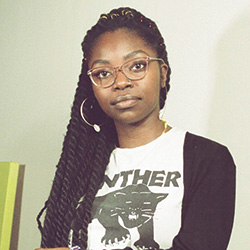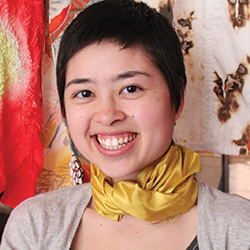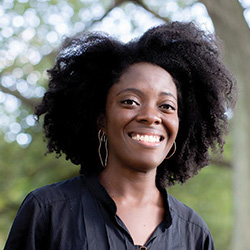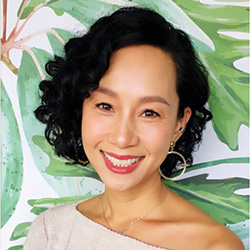Reframing for Action
POSTED ON: April 14, 2021
While 2020 will surely be remembered for the COVID-19 pandemic, the year was also marked by the anguish provoked by ongoing violence against Black Americans, most horrifically exemplified by the murder of George Floyd last May. As one means of responding to the crisis, a coalition from the Cooper community worked to provide more opportunities for discussion.
Specifically, the coalition wanted to introduce Professor Kimberlé Crenshaw’s concept of intersectionality, a lens for understanding the complex ways that multiple forms of oppression can interact to inform a person’s particular experience—the intersection of racism and sexism faced by Black women, for instance. As HSS Associate Dean Nada Ayad explained, “An intersectional justice framework advocates for the systematic equitable treatment of people of all races, classes, genders, and sexualities, that results in equitable opportunities and outcomes for everyone. All people are able to achieve their full potential, regardless.”

Last summer, members of the Black Student Union, Cooper Climate Coalition, and other students collaborated with Dean of Students Chris Chamberlin and Associate Dean Ayad to enhance first-year students’ orientation with 2-hour reading groups dedicated to studying texts centered around the theme of intersectional justice. One of the organizers, art senior Alisa Petrosova, wondered how Cooper could incorporate discussions about justice into the curriculum: “What would happen if we started those conversations earlier in our journey? How could this contextualize our disciplines as well as the humanities?” These sessions were led by an array of academics and artists in literature, history, and other fields whose work contends with racism and the complex legacy of colonialism. By all accounts, the sessions were a great success and lauded by the incoming students.
In a similar spirit the alliance behind the reading groups decided to expand the conversation by offering a lecture series that began in Fall 2020. One member of the Cooper Climate Coalition, Brighton Hyunh, supports the expanded conversation on intersectionality because, as he sees it, the concept gives a far more accurate picture of the impact our actions have in a whole host of arenas, from climate activism to the fight for racial justice. The civil engineering senior stresses that singular environmental changes often intersect with broader patterns of racial and class inequality. By way of example, decline in salmon populations in a given region, he says, “could interrupt cultural traditions associated with catching salmon or could disrupt an integral food source for impoverished groups. Meanwhile other communities within the area may have the financial ability to purchase imported or farmed fish and never experience a cultural or nutritional loss from no longer having local salmon. In this one effect of climate change, culture and food security immediately become areas of concern that affect individual populations.”

Framed around this kind of approach to seeing the systemic nature of inequality, the Intersectional Justice Lecture Series, as the organizers dubbed it, has also aimed at challenging how academic knowledge production itself is often shaped by exclusionary institutions and practices. The series launched with Miyuki Baker and Ra Malika Imhotep, founders of The Church of Black Feminist Thought. The pair spoke at a community-wide online lecture where, among other topics, they introduce their concept of “Embodied Citation,” an idea that riffs on the bibliography page of a research paper. The goal, as they explain on their website, “is to share citations in more accessible ways and to surface all the hidden labor done by black feminist artists, scholars, and writers.”
Their talk, given last September, described the roots of the project and specific practices that can help us interrogate dominant historical narratives to reveal the essential roles played by people who, until very recently, have been largely ignored in the traditional academic canon. Nora Ashwood, a sophomore in the School of Art who attended the talk, learned about an important document in Black feminist thought, the 1977 statement of the Combahee River Collective. The group, who Ashwood is now researching, describe systems of racial, sexual, heterosexual, and class oppression as interlocking. Noting the ways that this understanding informs her work on Cooper’s student council, Nora says, “I don’t think we can work towards change or establishing empathy if we don’t first try to study the structures already in place. This is something I’m still, and will forever, be learning about.”

The next event in the series was a conversation between Associate Dean Ayad and Yaa Gyasi, a young writer who had just published her second novel, Transcendent Kingdom. Gyasi’s debut novel, Homegoing, was celebrated as an expansive, highly original meditation on the fate a family torn apart by slavery, winning her the National Book Critics Circle John Leonard Prize and the PEN/Hemingway Award for Best First Novel.
Her highly anticipated sophomore effort explores the relationship between mother and daughter—one an immigrant from Ghana, the other an assimilated neuroscientist—who are grappling with the exigencies of being both immigrants from Africa and Black in America. Those dual pressures of immigration and racism embodied in one person’s experience is one example of Crenshaw’s intersectionality.

The final talk of the fall semester, entitled “Living Liberation: Dialectical Practice and Micro-Revolutions,” was given by Dr. Sandra So Hee Chi Kim, who reflected on her roles as an academic and community organizer. Dr. Kim’s talk described how she has integrated her scholarly training into grassroots racial justice education and community-building.
After Dr. Kim’s lecture, Susannah Lee Kandikatti, a student at the University of Hawaii at Mānoa, was moved to write to Associate Dean Ayad. “There are many days,” she wrote, “when I feel hopeless about the state of our nation and the world, but Dr. Kim’s talk was truly reinvigorating knowing that the small steps we take together, although small, are important and significant.”
Brighton concurs: “Intersectionality allows us to have a broader mindset as we notice links and causes that might have not been immediately obvious before.” The result, he says, is “more accurate problem solving.”
The series, which continued in Spring 2021 with three more speakers, keeps exploring various issues using an intersectional lens. Associate Dean Ayad encourages all members of the Cooper community to join in on the conversation and to share suggestions for future speakers with her or Dean Chamberlin: “The process is very open and collaborative, and we would love your input.”




